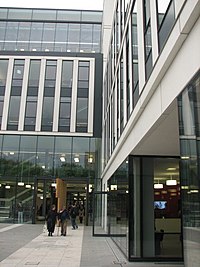Informatics
[1][11] The Government of Canada uses the term to refer to operational units offering network and computer services to the various departments.[12] In 1956, the German informatician Karl Steinbuch and engineer Helmut Gröttrup coined the word Informatik when they developed the Informatik-Anlage[13] for the Quelle mail-order management, one of the earliest commercial applications of data processing.In April 1957, Steinbuch published a paper called Informatik: Automatische Informationsverarbeitung ("Informatics: Automatic Information Processing").Furthermore, they stated that the primary goal of health informatics can be distinguished as follows: To provide solutions for problems related to data, information, and knowledge processing.Kolin proposed an interpretation of informatics as a fundamental science that studies information processes in nature, society, and technical systems.[22] A broad interpretation of informatics, as "the study of the structure, algorithms, behaviour, and interactions of natural and artificial computational systems," was introduced by the University of Edinburgh in 1994.In 2003, Yingxu Wang popularized term cognitive informatics, described as follows:[24] Supplementary to matter and energy, information is the third essence for modeling the world.In some countries such as Germany, Russia, France, and Italy, the term informatics in many contexts (but not always) can translate directly to computer science.
Informatics (disambiguation)Library scienceInformation technologyInformatics Europecomputer sciencecomputingtransformation of informationsocial computingTheoretical computer scienceComputer engineeringTechnical informaticsNeurocomputingNeural computationNeuroinformaticsBioinformaticsHydroinformaticsEcoinformaticsSocial informaticsInformatics ForumSchool of Informaticsinformation systemsinformation scienceinformation theoryinformation engineeringcontinental Europeinformation and computer sciencetechnical universitiescomputer science & engineeringUnited Statesdata sciencehealthcarehealth informaticsUniversity of Washingtonnatural computationGovernment of CanadaHistory of computer scienceKarl SteinbuchHelmut GröttrupQuelleFrenchPhilippe DreyfusComputational informaticsarchival sciencenursing informaticspublic health informaticsmedical informaticsbusiness informaticsforest informaticslegal informaticsUniversity of EdinburghScottish Informatics and Computer Science AllianceKyoto University School of Informaticscognitive informaticsDecoding the UniverseAssociation for Computing MachineryResearch Assessment ExerciseMIT Schwarzman College of Computinggeoinformaticsirrigation informaticsRussiaInternational Neuroinformatics Coordinating Facilitydata managementartificial intelligencecomputation and languagecomputational complexitycomputational engineeringfinancesciencecomputational geometrycomputational game theorycomputer visionpattern recognitioncomputers and societycryptographysecuritydata structuresalgorithmsdatabasesdigital librariesdistributedparallelclusteremerging technologiesformal languagesautomata theorygraphicshardware architecturehuman-computer Interactioninformation retrievallogic in computer sciencemachine learningmathematical softwaremultiagent systemsmultimedianetworkinginternet architectureneural computingevolutionary computingnumerical analysisoperating systemsperformanceprogramming languagesroboticssocialinformation networkssoftware engineeringsymbolic computationsystemscontrolList of computer science conferencesInformation and ComputationActa InformaticaInformation Processing LettersNeural Information Processing SystemsJournal of Automata, Languages and CombinatoricsConference on Computer Vision and Pattern RecognitionSymposium on Theory of ComputingEuropean Conference on Computer VisionInternational Conference on Computer VisionInternational Conference on Machine LearningAlgorithmicaSymposium on Foundations of Computer ScienceEuropean Symposium on AlgorithmsFundamenta InformaticaeSymposium on Discrete AlgorithmsJournal of Logic and Computation